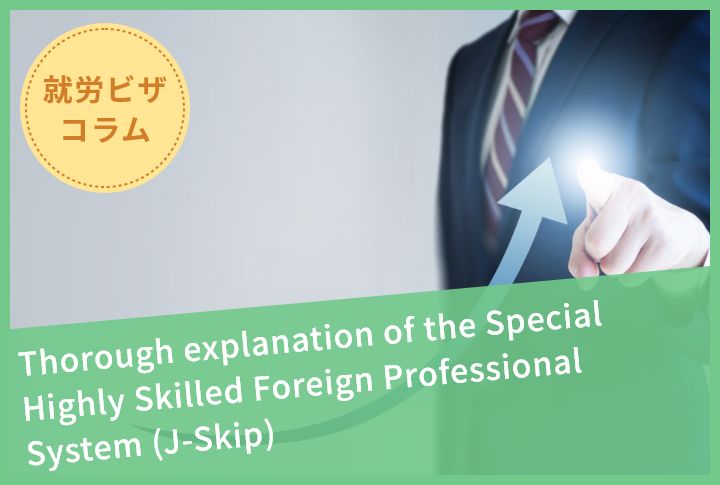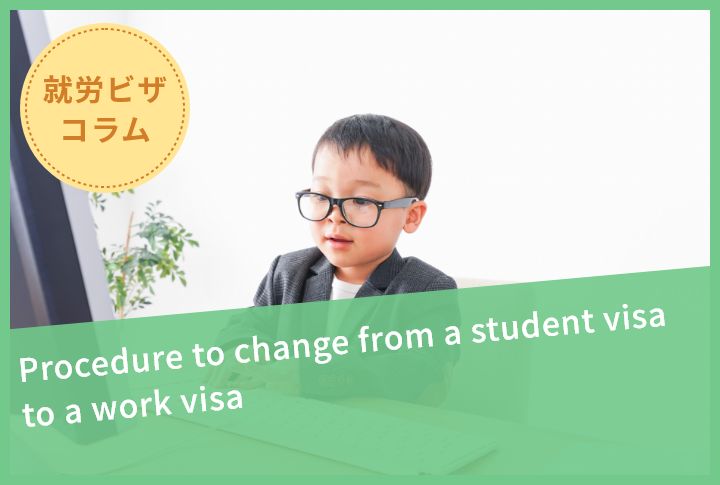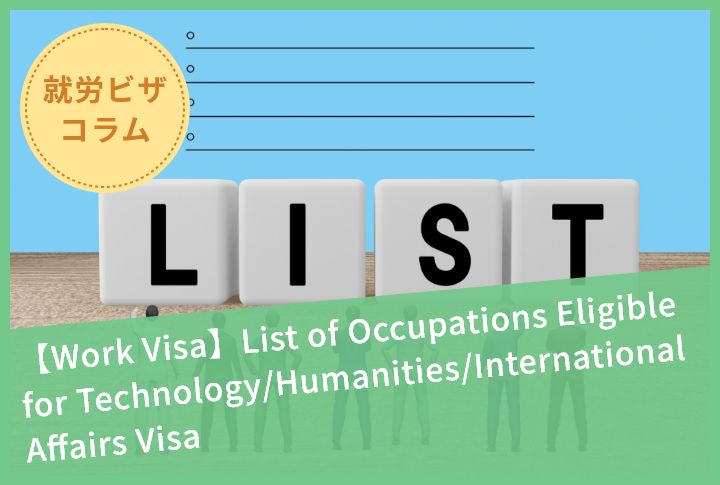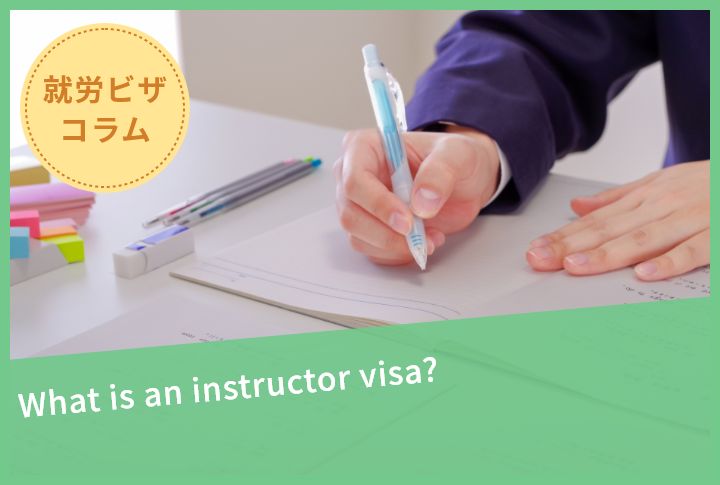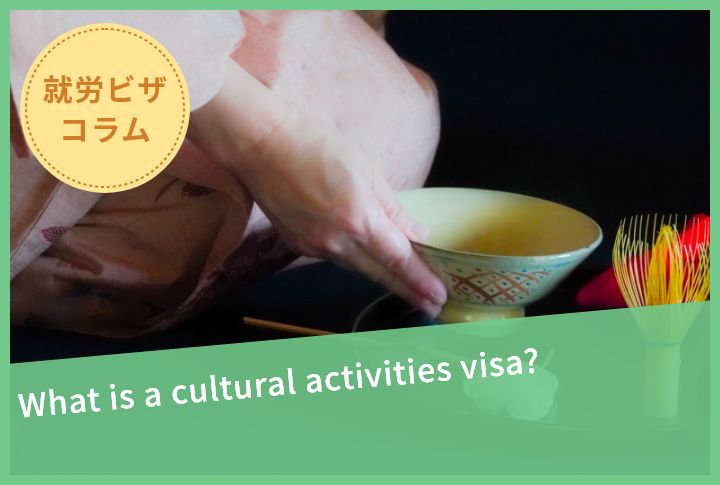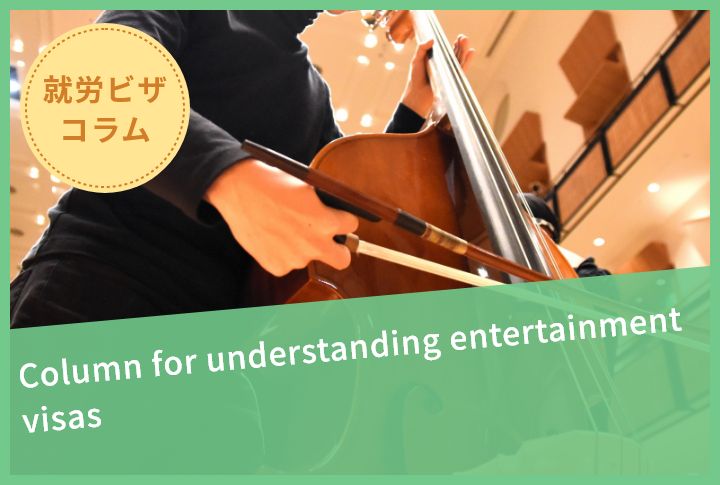【Case Study】It’s a must-see! An actual case of permission for highly skilled professional visa
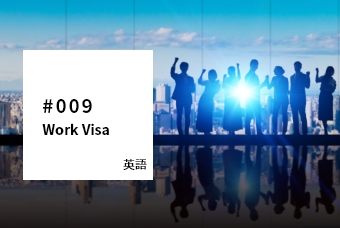
【Case】
Mr. A, who is studying in Japan, is currently enrolled in MBA course at a graduate school. He wanted to work at a Japanese company after graduation and received a job offer from a listed company. He is expected to be assigned to the Corporate Strategy Department after starting to work there.
When he conducted some research regarding the change of status of residence to a work visa, he found a visa called a highly skilled professional visa, which gives preferential treatments such as relaxation of permanent resident visa requirements and permission to bring parents. Mr. A became interested in the highly skilled professional visa and came to us for consultation to take on the challenge himself.
The point calculation is important for highly skilled personnel to obtain a highly-skilled professional visa.
In this article, we will explain the point calculation for highly skilled professional visas, as well as the preferential treatment, etc. with actual examples.
Index
1. What is a highly skilled professional visa?
The status of residence of Highly Skilled Professional was newly established on April 1, 2015 with the aim of actively accepting foreigners with highly specialized abilities and is roughly divided into 2 types: Highly Skilled Professional (i) and Highly Skilled Professional (ii). Foreign nationals with the status of residence of Highly Skilled Professional or foreign nationals who meets the requirements for the status of residence of Highly Skilled Professional are called highly skilled foreign professionals or highly skilled professional.
Before the establishment of the status of residence of highly skilled professional, the status of residence of designated activities were given to excellent foreigners with highly specialized abilities based on the notification regarding advanced specialization made by the Minister of Justice. In order to accept such excellent foreigners more positively than before, the status of residence of highly skilled professional came to be stipulated by law (the Immigration Act) instead of a notification.
The status of residence of highly skilled professional is stipulated as follows in the Appended Table I (2) of the Immigration Act, and items (i) and (ii) are respectively divided into 3 categories: (a), (b), and (c).
The Appended Table I (2) of the Immigration Act (the right-hand column under “Highly Skilled Professional”)
(i) Activities that fall under any of the following items (a) through (c) to be carried out by a person meeting the requirements provided by Ministry of Justice Order as a professional with highly-skilled capabilities, and are expected to contribute to the development of academic research or economy of Japan:
(a) activities of research, research instruction or education based on a contract signed with a public or private organization in Japan designated by the Minister of Justice, activities of personally operating a business related to the activities in conjunction with those activities, or activities of research, research instruction or education based on a contract signed with a public or private organization in Japan other than the organizations designated by the Minister of Justice;
(b) activities to engage in duties requiring knowledge or skills in the field of natural sciences or humanities based on a contract signed with a public or private organization in Japan designated by the Minister of Justice or activities to personally manage the business related to the activities in conjunction with those activities;
(c) activities to operate international trade or some other business, or to engage in the management of such business at a public or private organization in Japan designated by the Minister of Justice, or in conjunction with these activities, activities to personally manage the business related to such activities.
(ii) The following activities carried out by a person who has engaged in the activities listed in the preceding item and who meets the requirements provided by Ministry of Justice Order as a person whose stay contributes to the interests of Japan:
(a) activities of research, research instruction or education based on a contract signed with a public or private organization in Japan;
(b) activities to engage in duties requiring knowledge or skills in the field of natural sciences or humanities based on a contract signed with a public or private organization in Japan;
(c) activities to operate business of international trade or other businesses at a public or private organization in Japan, or to engage in the management of those businesses;
(d) activities (except for the activities that fall under any of the items (a) through (c)) listed in the right-hand column of the “Professor” section to the “Journalist” section in Table (1) or the activities listed in the right-hand column in the “Legal/Accounting Services,” “Medical Services,” “Instructor,” “Engineer/Specialist in Humanities/ International Services,” “Nursing Care,” “Entertainer,” or “Skilled Labor” sections, or in item (ii) of the right-hand column of the “Specified Skilled Worker” section in this Table, carried out in conjunction with any of the activities in items (a) through (c).
Item (i) (a) is called advanced academic research activities and is intended for those who are in a researcher positions at universities or companies such as researchers, scientists, and university professors.
Item (i) (b) is called advanced specialized/technical activities, and typical examples for this item are doctors, lawyers, and IT engineers, although it covers a wide range of specialized technical occupations. There are many parts that overlap with the activities of the status of residence of “Engineer/Specialist in Humanities/International Services,” but the status of residence of Highly Skilled Professional (i) (b) does not include the international business category unlike the status of residence of “Engineer/Specialist in Humanities/International Services.” Therefore, it is not possible to obtain a status of residence of highly skilled professional for occupations such as interpretation/translation and language instruction.
Item (i) (c) is called advanced operation and management activities, which is applicable to managers or administrators of companies. Although it is very similar to the status of residence of business manager, this one is only given when corporate activities are expected to be fairly stable based on the person’s academic background and the business content/scale and to contribute to the economic development of Japan.
2. What is the point system for highly skilled professional visas?
The eligibility for status of residence of highly skilled professional is as seen above, but the provisions in the Ministerial Ordinance on Criteria for Landing Permission, concerning the highly skilled professional visas are significantly different from other statuses of residence. The Ministerial Ordinance on Criteria for Landing Permission delegates determination of details to the Ministerial Ordinance on Highly Skilled Professional, which set forth that Highly Skilled Professional (i) is applicable to those who score 70 points or more as a result of calculation according to the point table.
We can only explain a part of the point table here. First, extra bonuses are given according to the applicant’s educational background, work history, annual income, and age, as well as research achievements, qualifications, Japanese proficiency, etc., which vary depending on the category ((a), (b), and (c)). Second, for the advanced specialization/technical field (Highly Skilled Professional (i) (b)) and the advanced operation/management field (Highly Skilled Professional (i) (c)), the minimum annual income standard is 3 million yen.
If the result of calculating your own points is 70 points or more, you can challenge to obtain the status of residence of highly skilled professional. Below is the link provided by the Ministry of Justice, so please try calculating!
http://www.immi-moj.go.jp/newimmiact_3/pdf/h29_06_point-hyou.pdf
3. Preferential treatments for highly skilled professional visa holders
The following incentives are provided for foreigners who work in Japan with the status of residence of highly skilled professional.
1) Multiple activities are permitted while staying in Japan
If you have any other work visa, you are only allowed to engage in activities within the scope of a single status of residence which you have, and if you want to do business beyond the scope of your status of residence, you must obtain permission to engage in activity other than that permitted under the status of residence previously granted. On the other hand, those who have the status of residence of highly skilled professional are permitted to carry out main activities as well as business management activities related thereto.
2) “5-year” period of stay
Those who are under the status of residence of Highly Skilled Professional (i) is uniformly granted a period of stay of 5 years, which is the longest period of stay under the Immigration Act.
3) Requirements for permission for permanent residence is relaxed
In principle, it is necessary to stay in Japan for 10 years or more in order to obtain a permanent resident visa. Nevertheless, such number of years is shortened to 3 years for highly skilled foreign professionals whose score pursuant to the point calculation table is 70 points or higher, and to 1 year for highly skilled foreign professionals whose score pursuant to the point calculation table is 80 points or higher.
4) Your spouse is permitted to work
Spouses of work visa holders can stay in Japan under the status of residence of “Dependent” and can work within 28 hours per week after getting permission to engage in activity other than that permitted under the status of residence previously granted. On the other hand, spouses of foreigners under the status of residence of highly skilled professional may engage in any work activities that fall under activities for the statuses of residence of “Researcher,” “Instructor,” “Engineer/Specialist in Humanities/International Services,” and “Entertainment” without time limitation. Normally, in order to carry out such activities, spouses must meet certain requirements such as educational background and work experience, but for spouses of foreigners under the status of residence of highly skilled professional, there is no academic or work requirements to work.
In this case, spouses will be granted the status of residence of “Designated Activities,” and they will be required to engage in activities which fall under the status of residence of “Researcher,” “Instructor,” “Engineer/Specialist in Humanities/International Services,” or “Entertainment”; to receive remuneration equivalent to or more than that of a Japanese person; and to live with the highly skilled foreign professional.
5) Your parents can be invited to Japan
When a highly skilled foreign professional or his/her spouse raises a child under the age of 7, parents of the highly skilled foreign professional or his/her spouse can be invited to Japan. Parents can also be invited for the purpose of assisting the pregnant spouse of a highly skilled foreign professional or the highly skilled foreign professional who is pregnant.
Having said that, such invitation of parents is permitted only when the annual household income of the highly skilled foreign professional is 8 million yen or higher. In addition, only parents of either the highly skilled foreign personnel or his/her spouse can be invited.
6) Your housemaid can be invited to Japan
If the annual household income of a highly skilled foreign professional is 10 million yen or more, under certain conditions, he/she can invite and continue to hire the housemaid who has been working since before he/she came to Japan. If his/her spouse is unable to engage in daily housework due to illness, etc., or if he/she has a child under the age of 13, he/she can newly hire a housemaid after entering Japan and invite the housemaid to Japan later.
7) Priority is given to the procedures for entering to and staying in Japan
For examination regarding entry to and residence in Japan, highly skilled foreign professionals are given priority over foreigners under other statuses of residence. Specifically, Application for Certificate of Eligibility will be processed within 10 days of receipt of the application, and Application for Change of Status of Residence and Application for Extension of Period of Stay will be processed within 5 days of receipt of the application.
4. Highly Skilled Professional (ii)
If you stay in Japan with the status of residence of Highly Skilled Professional (i) for 3 years or more, you can change your status of residence to Highly Skilled Professional (ii) (not automatically and you will need to apply for the change). Like Highly Skilled Professional (i), Highly Skilled Professional (ii) has 3 activity categories: (a), (b) and (c).
While the period of stay for Highly Skilled Professional (i) is 5 years, the period of stay for Highly Skilled Professional (ii) is indefinite. Because of such indefinite period of stay, you no longer need to apply for permission to extend the period of stay.
Moreover, while Highly Skilled Professional (i) allows to carry out main activities and business management activities related to it, Highly Skilled Professional (ii) allows the main activities and much more, which correspond to most of the activities permitted under all types of work visas.
Lastly, preferential treatments include relaxation of requirements for permanent residency, spouse’s working, and bringing parents and a housemaid, just like for Highly Skilled Professional (i).
5. Summary of highly skilled professional visas
Mr. A in the case example was expected to have additional points for completing graduate school (master’s course) in Japan, as well as obtaining MBA, his age and annual income. When we interviewed him to find out details of his situation, we found out that he had passed N1 of Japanese Language Proficiency Test, and the university he went to was listed in the top 200 in the world ranking, so there were additional bonuses for these facts. As a result, he scored more than 70 points pursuant to the point table, and Mr. A was permitted to change his status of residence to Highly Skilled Professional (i) (b) in the advanced specialization/technical field.
Foreigners with the status of residence of highly skilled professional can receive various preferential treatments as explained above, which is different from other statuses of residence. If you get a visa of Highly Skilled Professional (ii), the period of stay will be unlimited, which is equivalent to permanent resident. In particular, the permission to bring parents to Japan seems to be attractive to foreigners, and in that sense, it is no exaggeration to say that foreigners under the status of residence of Highly Skilled Professional (ii) are given more privileges than permanent residents.
If you have graduated from a Japanese university, you will have big additional points compared to those who have graduated from overseas universities, so please give it a try!








